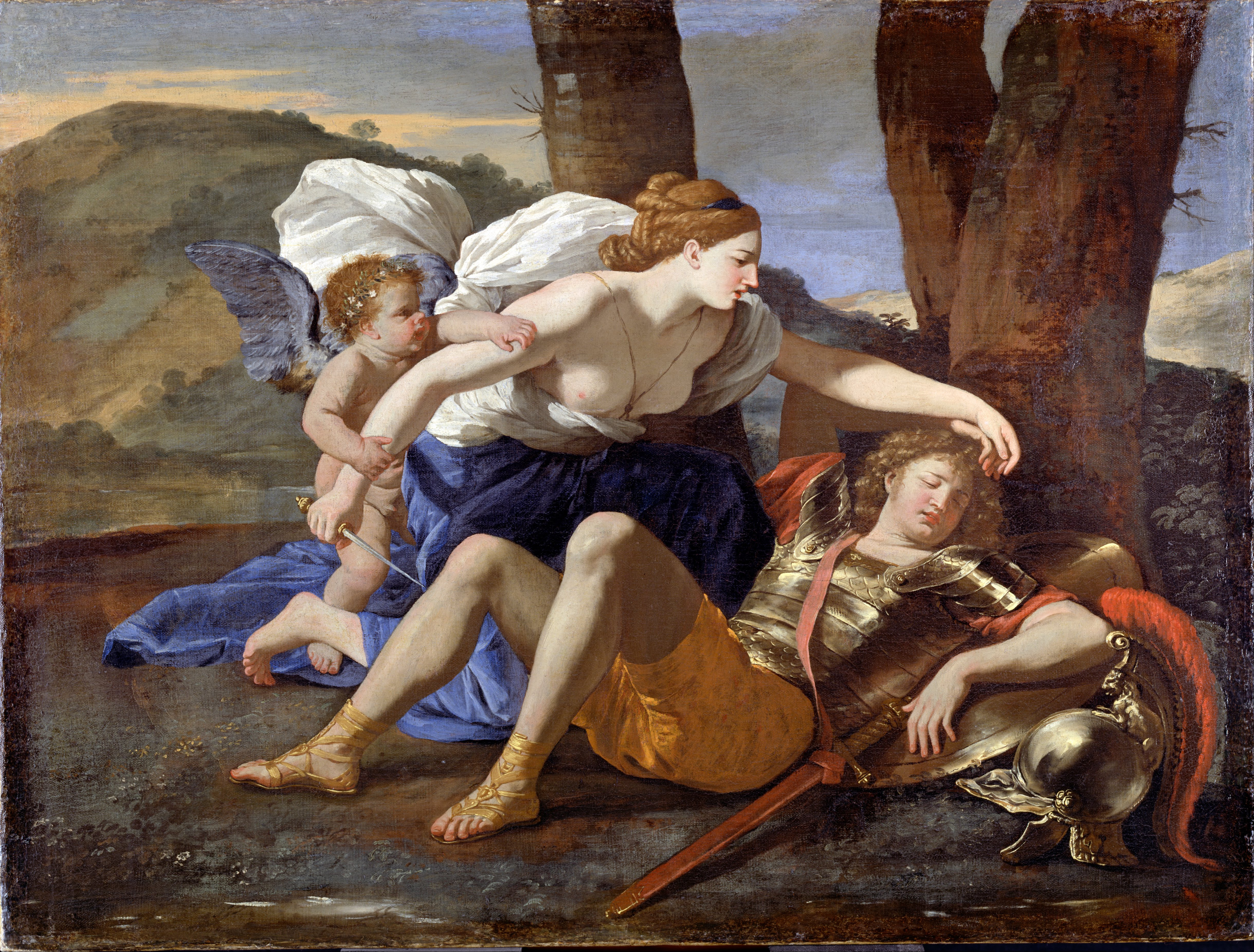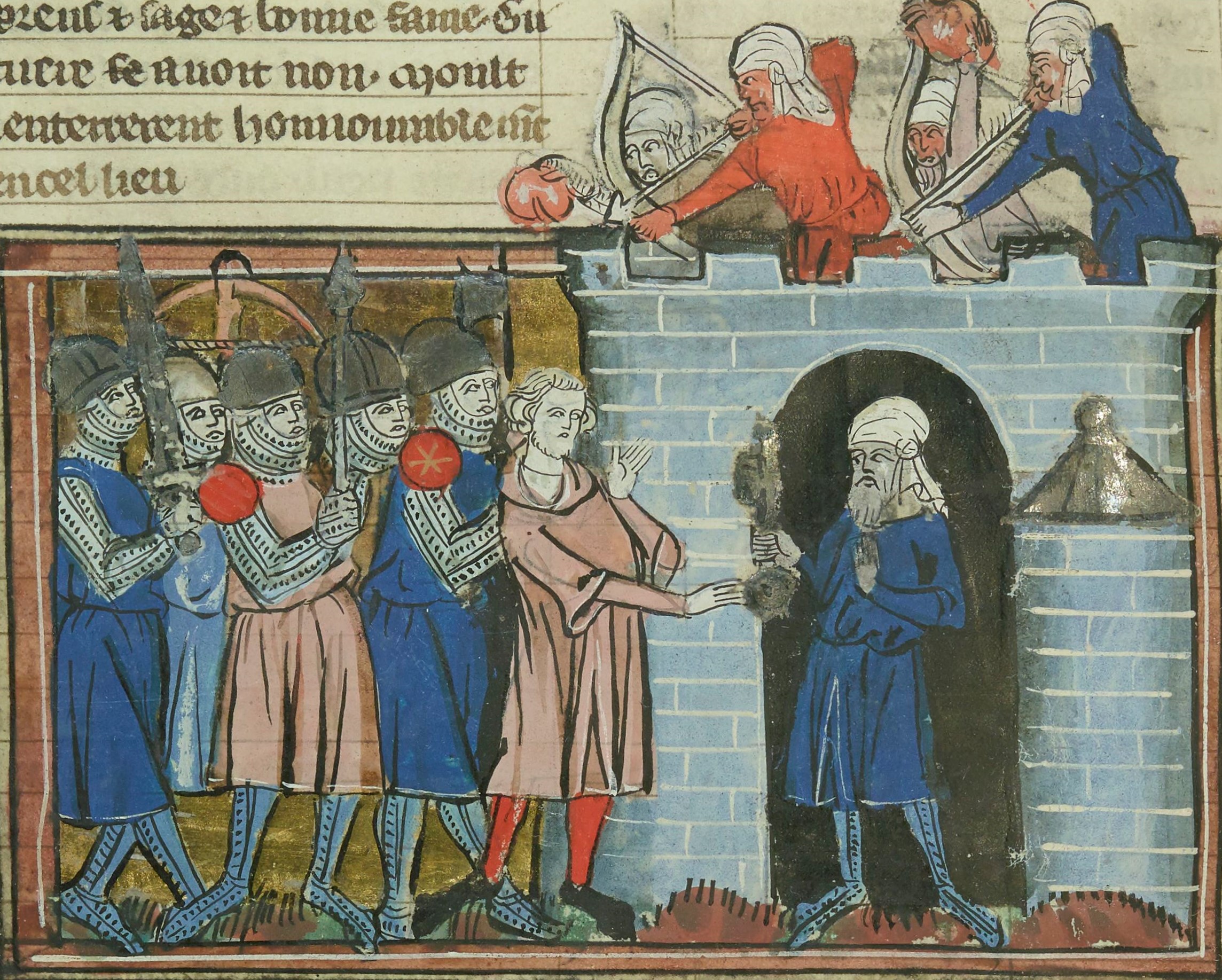|
Jerusalem Delivered
''Jerusalem Delivered'', also known as ''The Liberation of Jerusalem'' ( it, La Gerusalemme liberata ; ), is an epic poem by the Italian poet Torquato Tasso, first published in 1581, that tells a largely mythified version of the First Crusade in which Christian knights, led by Godfrey of Bouillon, battle Muslims in order to take Jerusalem. Tasso began work on the poem in the mid-1560s. Originally, it bore the title ''Il Goffredo''. It was completed in April, 1575 and that summer the poet read his work to Duke Alfonso of Ferrara and Lucrezia, Duchess of Urbino. A pirate edition of 14 cantos from the poem appeared in Venice in 1580. The first complete editions of ''Gerusalemme liberata'' were published in Parma and Ferrara in 1581. Tasso's choice of subject matter, an actual historic conflict between Christians and Muslims (albeit with fantastical elements added), had a historical grounding and created compositional implications (the narrative subject matter had a fixed en ... [...More Info...] [...Related Items...] OR: [Wikipedia] [Google] [Baidu] |
Hendecasyllable
In poetry, a hendecasyllable (sometimes hendecasyllabic) is a line of eleven syllables. The term may refer to several different poetic meters, the older of which are quantitative and used chiefly in classical (Ancient Greek and Latin) poetry, and the newer of which are syllabic or accentual-syllabic and used in medieval and modern poetry. Classical In classical poetry, "hendecasyllable" or "hendecasyllabic" may refer to any of three distinct 11-syllable Aeolic meters, used first in Ancient Greece and later, with little modification, by Roman poets. Aeolic meters are characterized by an Aeolic base × × followed by a choriamb – u u –; where –=a long syllable, u=a short syllable, and ×=an anceps, that is, a syllable either long or short. The three Aeolic hendecasyllables (with base and choriamb in bold) are: Phalaecian ( la, hendecasyllabus phalaecius): × × – u u – u – u – – This is a line used only occasionally in Greek choral odes and scolia, but a fav ... [...More Info...] [...Related Items...] OR: [Wikipedia] [Google] [Baidu] |
Heliodorus Of Emesa
Heliodorus Emesenus or Heliodorus of Emesa ( grc, Ἡλιόδωρος ὁ Ἐμεσηνός) is the author of the ancient Greek novel called the ''Aethiopica'' () or ''Theagenes and Chariclea'' (), which has been dated to the 220s or 370s AD. Identification He identifies himself at the end of his work as According to Tim Whitmarsh, 'from the race of the sun' "looks like a claim to hereditary priesthood," though "uncertainties" remain. According to ''The Cambridge History of Classical Literature'', "the personal link here established between the writer and Helios has also a literary purpose, as has Calasiris' flashback narrative" . The later tradition maintaining that Heliodorus had become a Christian bishop is likely fictional. Quoting Richard L. Hunter, See also * Emesene dynasty Other ancient Greek novelists: * Chariton – ''The Loves of Chaereas and Callirhoe'' * Xenophon of Ephesus – ''The Ephesian Tale'' * Achilles Tatius – ''Leucippe and Clitophon'' * Longus – ''D ... [...More Info...] [...Related Items...] OR: [Wikipedia] [Google] [Baidu] |
Bradamante
Bradamante (occasionally spelled Bradamant) is a fictional knight heroine in two epic poems of the Renaissance: '' Orlando Innamorato'' by Matteo Maria Boiardo and ''Orlando Furioso'' by Ludovico Ariosto. Since the poems exerted a wide influence on later culture, she became a recurring character in Western art. In ''Orlando Innamorato'' and ''Orlando Furioso'' Bradamante, a female Christian knight in the service of Charlemagne, is the sister of Rinaldo and the daughter of Duke Amon, the duke of Dordognes. She falls in love with a Saracen warrior named Ruggiero, but she refuses to marry him unless he converts from Islam. An expert in combat, she wields a magical lance that unhorses anyone it touches, and rescues Ruggiero from being imprisoned by the wizard Atlantes. She is described as wearing white, with a white shield and a crest of a pennon. She is one of the French warriors fighting during a Saracen invasion into France. She is in the middle of fighting a Saracen warrior, ... [...More Info...] [...Related Items...] OR: [Wikipedia] [Google] [Baidu] |
Camilla (mythology)
In Virgil's ''Aeneid'', Camilla of the Volsci is the daughter of King Metabus and Casmilla. Driven from his throne, Metabus is chased into the wilderness by armed Volsci, his infant daughter in his hands. The river Amasenus blocked his path, and, fearing for the child's welfare, Metabus bound her to a spear. He promised Diana that Camilla would be her servant, a warrior virgin. He then safely threw her to the other side, and swam across to retrieve her. The baby Camilla was suckled by a mare, and once her "first firm steps had eentaken, the small palms were armed with a keen javelin; her sire a bow and quiver from her shoulder slung." She was raised in her childhood to be a huntress and kept the companionship of her father and the shepherds in the hills and woods. Modern scholars are unsure if Camilla was entirely an original invention of Virgil, or represents some actual Roman myth. In his book ''Virgil's Aeneid: Semantic Relations and Proper Names'', Michael Paschalis spec ... [...More Info...] [...Related Items...] OR: [Wikipedia] [Google] [Baidu] |
Clorinda (Jerusalem Delivered)
Clorinda is a fictional character appearing in Torquato Tasso's poem ''Jerusalem Delivered'', first published in 1581. She is a warrior woman of the Saracen army. First introduced in the second canto of the poem, when she rescues from execution Sofronia and Olindo, two Christian lovers of Jerusalem, she is next discovered under the command of the King of Jerusalem, Aladine, aiding that city's defences, together with the bold knight Argantes. Tancred saw her on the field and fell in love with her, thus refusing to do battle with her. Because of this, a lesser champion was sent out from the Christian hosts, and Clorinda slew him. Erminia, her companion, being herself enamoured of Tancred, then escaped Jerusalem in the guise of Clorinda, purposing to enter the Christian camp, but being surprised by a party of knights without, she fled and was lost in the forests. Tancred falls in love with her in Canto 3. During a night battle in which she sets the Christian siege tower on fire, ... [...More Info...] [...Related Items...] OR: [Wikipedia] [Google] [Baidu] |
Tancred, Prince Of Galilee
Tancred (1075 – December 5 or December 12, 1112) was an Italo- Norman leader of the First Crusade who later became Prince of Galilee and regent of the Principality of Antioch. Tancred came from the house of Hauteville and was the great-grandson of Norman lord Tancred of Hauteville. Biography Early life Tancred was a son of Emma of Hauteville and Odo the Good Marquis. His maternal grandparents were Robert Guiscard and Guiscard's first wife Alberada of Buonalbergo. Emma was also a sister of Bohemond I of Antioch. First Crusade In 1096, Tancred joined his maternal uncle Bohemond on the First Crusade, and the two made their way to Constantinople. There, he was pressured to swear an oath to Byzantine Emperor Alexius I Comnenus, promising to give back any conquered land to the Byzantine Empire. Although the other leaders did not intend to keep their oaths, Tancred refused to swear the oath altogether. He participated in the siege of Nicaea in 1097, but the city was taken by ... [...More Info...] [...Related Items...] OR: [Wikipedia] [Google] [Baidu] |
Siege Of Jerusalem (1099)
The siege of Jerusalem (7 June – 15 July 1099) was waged by European forces of the First Crusade, resulting in the capture of the Holy City of Jerusalem from the Muslim Fatimid Caliphate, and laying the foundation for the Christian Kingdom of Jerusalem, which lasted almost two centuries. The capture of Jerusalem was the final major battle of the first of the Crusades to occupy the Holy Land begun in 1095. A number of eyewitness accounts of the siege were recorded, the most quoted being that from the anonymous '' Gesta Francorum''. Upon the declaration of the secular state, Godfrey of Bouillon, prominent among the leaders of the crusades, was elected ruler, eschewing the title "king." The siege led to the mass slaughter of thousands of Muslims and Jews and to the conversion of Muslim holy sites on the Temple Mount into Christian shrines. Background At the Council of Piacenza in 1095, Pope Urban II received envoys from Byzantine Emperor Alexios I asking Western Christians ... [...More Info...] [...Related Items...] OR: [Wikipedia] [Google] [Baidu] |
Virgil
Publius Vergilius Maro (; traditional dates 15 October 7021 September 19 BC), usually called Virgil or Vergil ( ) in English, was an ancient Roman poet of the Augustan period. He composed three of the most famous poems in Latin literature: the '' Eclogues'' (or ''Bucolics''), the '' Georgics'', and the epic ''Aeneid''. A number of minor poems, collected in the '' Appendix Vergiliana'', were attributed to him in ancient times, but modern scholars consider his authorship of these poems as dubious. Virgil's work has had wide and deep influence on Western literature, most notably Dante's '' Divine Comedy'', in which Virgil appears as the author's guide through Hell and Purgatory. Virgil has been traditionally ranked as one of Rome's greatest poets. His ''Aeneid'' is also considered a national epic of ancient Rome, a title held since composition. Life and works Birth and biographical tradition Virgil's biographical tradition is thought to depend on a lost biography by the Rom ... [...More Info...] [...Related Items...] OR: [Wikipedia] [Google] [Baidu] |
Homer
Homer (; grc, Ὅμηρος , ''Hómēros'') (born ) was a Greek poet who is credited as the author of the '' Iliad'' and the '' Odyssey'', two epic poems that are foundational works of ancient Greek literature. Homer is considered one of the most revered and influential authors in history. Homer's ''Iliad'' centers on a quarrel between King Agamemnon and the warrior Achilles during the last year of the Trojan War. The ''Odyssey'' chronicles the ten-year journey of Odysseus, king of Ithaca, back to his home after the fall of Troy. The poems are in Homeric Greek, also known as Epic Greek, a literary language which shows a mixture of features of the Ionic and Aeolic dialects from different centuries; the predominant influence is Eastern Ionic. Most researchers believe that the poems were originally transmitted orally. Homer's epic poems shaped aspects of ancient Greek culture and education, fostering ideals of heroism, glory, and honor. To Plato, Homer was simply t ... [...More Info...] [...Related Items...] OR: [Wikipedia] [Google] [Baidu] |
Orlando Furioso
''Orlando furioso'' (; ''The Frenzy of Orlando'', more loosely ''Raging Roland'') is an Italian epic poem by Ludovico Ariosto which has exerted a wide influence on later culture. The earliest version appeared in 1516, although the poem was not published in its complete form until 1532. ''Orlando furioso'' is a continuation of Matteo Maria Boiardo's unfinished romance '' Orlando innamorato'' (''Orlando in Love'', published posthumously in 1495). In its historical setting and characters, it shares some features with the Old French '' Chanson de Roland'' of the eleventh century, which tells of the death of Roland. The story is also a chivalric romance which stemmed from a tradition beginning in the late Middle Ages and continuing in popularity in the 16th century and well into the 17th. Orlando is the Christian knight known in French (and subsequently English) as Roland. The story takes place against the background of the war between Charlemagne's Christian paladins and the ... [...More Info...] [...Related Items...] OR: [Wikipedia] [Google] [Baidu] |








_-_Homer_and_his_Guide_(1874).jpg)
